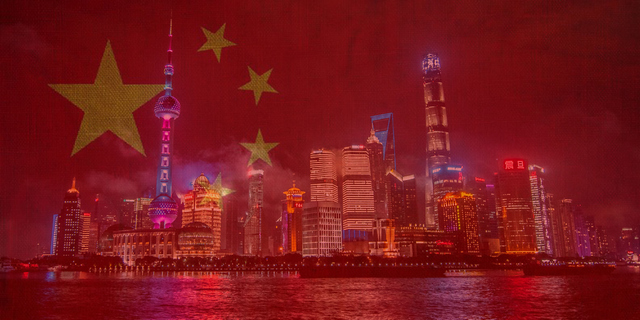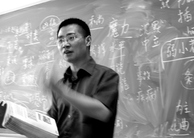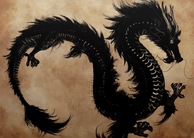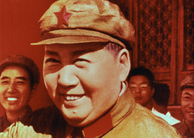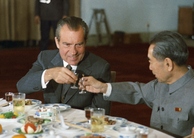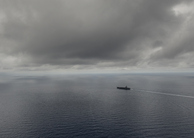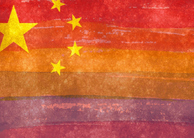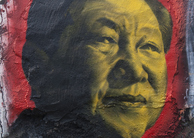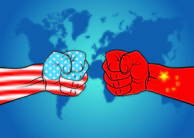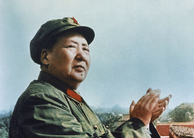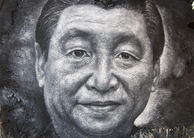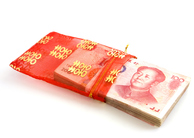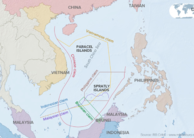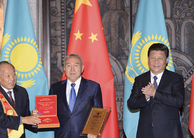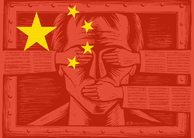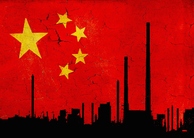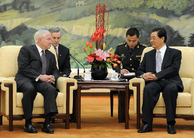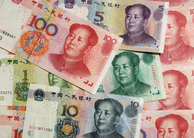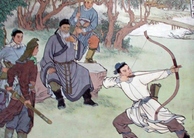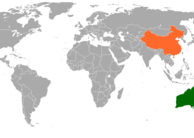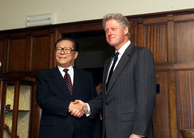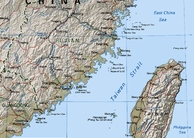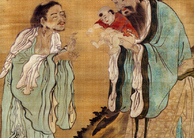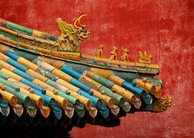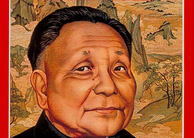|
China (tagged articles)
The keyword China is tagged in the following 58 articles.
2022, Vol. 14 No. 01
The study examines the degree to which Xi Jinping has brought about a strategic shift to the Chinese outward investment pattern and how this may present significant political leverage and military advantages for China in the Indian Ocean Region (... Read Article »
2021, Vol. 13 No. 11
The Sino-Vietnamese War remains one of the most peculiar military engagements during the Cold War. Conventional wisdom would hold that it was a proxy war in the vein of the United States’ war in Vietnam or the Soviet invasion of Afghanistan... Read Article »
2021, Vol. 13 No. 03
Feminism has grown to be a complex, multifaceted topic of conversation in China. It has witnessed a series of peaks and troughs that have both advanced and regressed the women’s movement since Mao’s era. This paper aims to evaluate the... Read Article »
2020, Vol. 2020 No. 1
This study analyzes the publications of Dr. Wu Lien-teh, health commissioner during the Manchurian plague epidemics, to demonstrate how poor cultural communication can adversely affect medical care and health policies. Combined with a case study... Read Article »
2020, Vol. 2020 No. 1
China’s rise as a global power has major implications for the future of free speech and media censorship both within and outside the People’s Republic. While there are numerous examples of the Chinese Communist Party employing blanket... Read Article »
2020, Vol. 12 No. 07
For the past several years, the study of German jurist Carl Schmitt has exploded in China. Floria Sapio remarks that Schmitt has enjoyed “enormous currency among mainland Chinese scholars since the 2000s.”[1] Even though Schmitt has... Read Article »
2019, Vol. 11 No. 02
In recent years, climate change has been increasingly framed as a security issue, with some theorists going so far as to call it the most important security issue of the 21st century. This paper will examine the relationship between climate change... Read Article »
2018, Vol. 10 No. 05
Universal secondary education is vital if rural China is to achieve long-term socioeconomic sustainability, as education offers the pragmatic skills and knowledge base that would allow those living in rural China to adapt to the knowledge-intensive... Read Article »
2018, Vol. 10 No. 04
The promotion of general education is a matter of ongoing debate owing to the pressing question of how to improve higher education in China. However, the available analytical material still remains somewhat experiential and emotion-oriented.In this... Read Article »
2017, Vol. 9 No. 12
Since its emergence in the 19th century, fantasy fiction has proliferated throughout the world, from the global craze of Lord of the Rings (1954) to Harry Potter (1997). As a sub-genre of fantasy based on Chinese traditional mythology and martial... Read Article »
2017, Vol. 11 No. 1
The relationship between the People's Republic of China (PRC) and the Holy See appears to be an uneasy association between opposites. With over 1 billion people, the PRC is "the world's most populous state," while the Holy See is housed in tiny... Read Article »
2017, Vol. 9 No. 11
This article uses two decision-making theories – rational choice theory and prospect theory – to examine China’s resolution to intervene militarily in the Korean War. I argue that Chairman Mao Zedong was in a domain of loss both... Read Article »
2017, Vol. 9 No. 11
Regardless of which side of the Pacific individuals reside on, the idea of the government taking property and uprooting citizens tends to evoke a considerable amount of backlash. In examining the eminent domain practices of the United States and... Read Article »
2016, Vol. 7 No. 1
This paper investigates the influence of U.S. foreign policymakers' perceptions towards China on policy formulation during the Cold War. The influence of perceptions, especially perceptions surrounding the ideology of combatant states, is especially... Read Article »
2016, Vol. 7 No. 1
Foreign policymakers, academics, and regional pundits have all acknowledged the importance of the South China Sea. This region, rich in resources and trade, is the subject of intense territorial contest and is perpetually at risk for escalation... Read Article »
2016, Vol. 8 No. 12
The sheer number of distinct dialects present within the country has long complicated Chinese language standardization and language policy. Furthermore, China’s history with colonial powers throughout the past three centuries has led to a... Read Article »
2016, Vol. 8 No. 12
Ever since its elimination from the list of mental illnesses in 2001, and decriminalization in 1997, homosexuality in China continues to be at the forefront of China’s growing human rights debate. The estimated 40 million lesbian, gay, bisexual... Read Article »
2016, Vol. 8 No. 11
Jean Baudrillard makes the argument that in a postmodern globalized world, in which competing utopian metanarratives from both sides of the political spectrum have been exposed as failures, society is no longer constructed or ordered through common... Read Article »
2016, Vol. 8 No. 10
Hong Kong is standing at a crucial social and political juncture in its history. A former British colony, it has retained its unique legal system, electoral system, and political democracy. These systems have worked together to create a society... Read Article »
2016, Vol. 8 No. 10
China and the Chinese Communist Party (CCP) that leads it has historically limited itself in regards to projecting power and inserting itself into international disputes and affairs. With the exception of its involvement in the Korean War, most... Read Article »
2016, Vol. 8 No. 09
American media generally depicts nationalism as a negative concept, which is threatening to peace and security. However, in its broadest sense, nationalism can incorporate two phenomena: “(1) the attitude that the members of a nation have... Read Article »
2016, Vol. 2015/2016 No. 3
Chinese intervention in Korea in October 1950 continued a period of hideous violence and death in China's history. Between 1927 and 1949, around 21.5 to 27.5 million Chinese had died in the Second Sino-Japanese War and in the Chinese Civil War.... Read Article »
2016, Vol. 9 No. 2
Since the founding of the People's Republic of China in 1949, the Chinese Communist Party has used publicly displayed propaganda art as a means of maintaining power. During the early years of the PRC, propaganda posters played a large role in establishing... Read Article »
2015, Vol. 2 No. 1
This paper seeks to address one of the most common critiques of Asian firms doing business in Africa: that low levels of corporate governance and poor managerial practices have undermined anti-corruption efforts throughout the continent. The paper... Read Article »
2016, Vol. 8 No. 01
There is a longstanding territorial dispute raging in the South China Sea between China, the Philippines, Malaysia, Taiwan, Brunei, and Vietnam over several groups of islands called the Spratlys and Parcels. While most of the players involved are... Read Article »
2016, Vol. 9 No. 1
The New Silk Road, formally termed the Silk Road Economic Belt and also known as the "One Belt, One Road," was first proposed by China's President Xi Jinping during his 2013 visit to Central Asia. This initiative aims to revive the historical vitality... Read Article »
2015, Vol. 7 No. 09
In contemporary China, as a result of centuries of censorship, major dissent at the domestic level has become rather rare. This research paper examines the mechanics of censorship in China. It will explore the evolution of censorship over time as... Read Article »
2015, Vol. 7 No. 04
In a 1920 speech on women’s literature, the cultural critic Zhou Zuoren argued that the value of literature lies in its power to show us new human perspectives and “erase all boundaries and distances” (Zhou 1920), as spoken in... Read Article »
2015, Vol. 7 No. 03
Through the late 1960s the French New Wave became a pronounced and significant factor in the creation and development of Hollywood films. Such movements had gained popularity through an ability to engage with a younger audience by means of a more... Read Article »
2015, Vol. 2014/2015 No. 1
In October 1950, Chinese troops under the name of the Chinese People’s Volunteer Army (CPV) crossed the Yalu River to assist North Korean armies, and engaged in the Korean War in an offensive manner after the U.S. troops crossed the 38th parallel... Read Article »
2014, Vol. 6 No. 12
Since 2004, the proliferation of marriage markets in China has made BaiFaXiangQin an attractive alternative for parents that are anxious and eager to help their single children find a suitable match for marriage. This paper discusses the possible... Read Article »
2014, Vol. 6 No. 10
Is China building a harmonious world? In order to answer this question, it is necessary go beyond simply reviewing the official narrative of the 'harmonious world' policy and instead consider it in relation to China's international and domestic... Read Article »
2014, Vol. 6 No. 09
Up until the 19th century, China held a position as a great world power. However, for the last two hundred years the West has dominated the world technologically, economically, and politically. The point at which the West began its relative dominance... Read Article »
2014, Vol. 6 No. 01
In 1992 during his famed Southern Trip, Deng Xiaoping, the paramount leader of the Communist Party of China, proclaimed that "To Get Rich Is Glorious[1]." This slogan ignited the economic revolution in China. It is through this very notion of economic... Read Article »
2013, Vol. 3 No. 1
Over the past several decades, with the introduction of ecology as a scientific pursuit, China has made advancements in ensuring the health and sustainability of its forests and biodiversity. A very large number of endemic plant and vertebrate species... Read Article »
2013, Vol. 7 No. 1
South Korea, also known as the Republic of Korea (ROK), is a remarkable country in many ways. It survived the Korean War, supported by American military assistance. It successfully transitioned to democracy after nearly 40 years of authoritarian... Read Article »
2013, Vol. 5 No. 10
This paper analyzes state refugee policies through the lenses of foreign policy behavior and policy linkage. The case studies compare variations in Chinese state policies towards refugees from North Korea, Myanmar, and Vietnam. Through an additional... Read Article »
2013, Vol. 5 No. 08
This report examines the Chinese economic model, the potential for future Chinese growth, and the implications for Australia. An examination of factors that have contributed to the rise of the modern Chinese economy including demographic factors... Read Article »
2013, Vol. 3 No. 1
Postmaterialist values, those that emphasize higher-order human needs, have become widely accepted as the determining force behind environmentalism in the West. Little research has been dedicated to studying the importance of these values outside... Read Article »
2013, Vol. 5 No. 04
Corruption is damaging in almost every economic aspect, but it can play a crucial role in the dynamics of political changes and reforms. Examination of corruption’s effect in the economic reforms of China during the 1980s reveals that corruption... Read Article »
2012, Vol. 4 No. 10
Since his death in 1142 CE, Yue Fei of the Song Dynasty (960-1279) has been revered by the Chinese as a national hero. His skill as a military leader, bravery in battle, and Chinese national pride have made him one of the most popular figures in... Read Article »
2012, Vol. 4 No. 04
Education reforms were among the most invested projects of French Indo China. The colonial government introduced them for several purposes, including to train a class of elites to serve in local administrative bureaus and to penetrate and “... Read Article »
2011, Vol. 5 No. 1
Over the past thirty years, China has moved from a communist to a capitalist economy. This change has pushed millions of young, rural women to migrate to the cities in order to begin working in its many booming factories. These women, if they manage... Read Article »
2011, Vol. 5 No. 1
In 2001, Goldman Sachs named Brazil one of the four most important emerging economies, with China, Russia and India.1 The BRICs, a term coined by Jim O’Neill, are prophesized to become four of the top six economies in the world by 2050,2 and... Read Article »
2011, Vol. 4 No. 2
This essay seeks to elucidate the puzzle of China's policy decision to create a Sovereign Wealth Fund (SWF). Much literature has been put forth on the topic to predict the strategic benefits China may be pursuing through its investments in American... Read Article »
2011, Vol. 3 No. 02
Christianity has not gained a large number of adepts in China, if compared, for example, with Japan. But Christianity in China, in the late Imperial Era, had a number of particularities. Moreover, Christianity sometimes influenced Chinese women&... Read Article »
2010, Vol. 2 No. 12
John Howard, then-Prime Minister of Australia, claimed that, ‘I count it as one of the great successes of this country’s foreign relations that we have simultaneously been able to strengthen our long-standing ties with the United States... Read Article »
2010, Vol. 4 No. 1
This analysis of U.S.- China relations was motivated by what I perceived to be misplaced "controversy" over Obama's China visit in autumn 2009 and his subsequent policy initiatives, which despite all of the public scorn are really no different from... Read Article »
2010, Vol. 2 No. 06
In 2005, during a period of heightened tensions between China and Taiwan and with the United States deeply embroiled in two major wars in Iraq and Afghanistan, the leading authority on East Asian security within the National Security Council nevertheless... Read Article »
2010, Vol. 2 No. 04
Throughout history, there have been several ways in which people perceive Tibet. Since it has traditionally been isolated from the world, culturally and geographically, the mystery it provokes has shaped most people’s beliefs into viewing... Read Article »
2010, Vol. 2 No. 04
Confucianism was one of the dominant political philosophies of Imperial China. Confucianism’s influence declined throughout the 19th century coinciding with the end of the Qing Dynasty in 1911. Some Chinese intellectuals, like Lu Xun, attacked... Read Article »
2010, Vol. 2 No. 02
In “Amor de lejos: Latino (Im)migration Literatures,” B.V. Olguin writes, “Latino/a (im)migration narratives…often illustrate the traumatic aspects of displacement by focusing in part on how immigration, migration, exile... Read Article »
2010, Vol. 2 No. 01
Since 1989, when economist John Williamson first conceived of the economic and policy recommendations known as the Washington Consensus (Williamson, 1989), this Consensus became generally accepted as the most effective model by which developing... Read Article »
2009, Vol. 1 No. 11
It is no secret that China today faces serious environmental challenges. The combination of a rapidly growing population and a lack of viable communication between the state and local communities have produced a difficult situation. Many argue... Read Article »
2008, Vol. 1 No. 2
South Asia is not in itself the primary zone of interest of China. However, China has since long used the region’s dynamics to achieve some of its most important strategic goals. Moreover, since India wishes to establish “its rightful... Read Article »
2007, Vol. 1 No. 1
China’s emergence as a key player in Africa, the impact of its presence and its challenges to traditional Western pre-eminence in African economies are among the hallmarks of the changing economic scenario in the twenty-first century. Beijing... Read Article »
2000, Vol. 1999/2000 No. 1
In order to understand why China has been recognised as a potential 21st Century superpower, it is necessary to understand what the term “superpower” encompasses. Domination of the world economy is arguably a key factor, as is internal... Read Article »
1997, Vol. 1996/1997 No. 2
On the nineteenth of February Deng Xiaoping, the dominant figure of Chinese politics for 19 years, died and left behind him a booming China, and a nation with many unresolved questions. The British media proclaimed the passing away of ‘... Read Article »
Expedited Article Review
Submit an article and get a decision fast.
If you need a fast decision, INQUIRIES Journal offers expedited processing of your submission for a small fee. Depending on the expedited review option you choose, you can receive a decision in as few as 5-days.
In addition to a shorter review period, the fee supports the journal's continued operation and open-access publishing model. Standard submissions are always free. Submit Now » - Submit an Article to Inquiries Journal -
|





